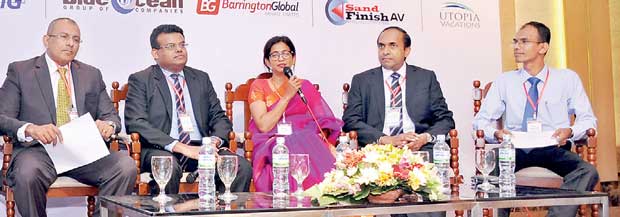01 Mar 2017 - {{hitsCtrl.values.hits}}
 From left: Acuity Partners Managing Director Ray Abeywardena, Principal at KPMG Shiluka Goonewardene, Softlogic Holdings Head of Investments Niloo Jayatilake, CSE CEO Rajeeva Bandaranaike and Tushara Jayaratne, Director External Relations & Surveillance, SEC
From left: Acuity Partners Managing Director Ray Abeywardena, Principal at KPMG Shiluka Goonewardene, Softlogic Holdings Head of Investments Niloo Jayatilake, CSE CEO Rajeeva Bandaranaike and Tushara Jayaratne, Director External Relations & Surveillance, SEC
Pic by Pradeep Dilruckshana
In a bid to turn around its fortunes, Sri Lanka’s capital market stakeholders want the government to play a bigger role in the market by way of listing state assets on the bourse and reactivating the state-run private sector pension fund, Employees’ Provident Fund (EPF).
Pointing at the current lackluster performance of the Colombo bourse, the market stakeholders, who met during a capital market conference in Colombo, stressed that the role of government is imperative at this juncture to develop the market, which is now on a downward spiral.
The Colombo bourse fell 5.8 percent in 2015 and 9.7 percent in 2016. Year-to-date market drop stands around 1.6 percent, while the regional peers clearly seem to be gaining.
“There are no investors in the market today,” Colombo Stock Exchange (CSE) CEO Rajeeva Bandaranaike said.
The decision said to have taken by the EPF to keep away from the market until investigations into some of its ill-thought out investments were completed, should not be a deterrent for the largest pension fund in the country to continue investing in fundamentally strong counters, Bandaranaike said.
The EPF, managed by the country’s Central Bank, came under severe flack during the tenure of Governor Ajith Nivard Cabraal for certain controversial investments it made.
“I think the state institutions should give a lead in coming back to the market and that’s essential,” Bandaranaike added.
The lack of confidence and the prevailing negative sentiment have kept high net worth investors, who account for about 60 percent of the market, away from investing.
Meanwhile Ray Abeywardena, Managing Director at Acuity Partners, a joint venture investment bank, drew a strong correlation between the confusing messages coming from the various factions in the government to the plight of the Colombo bourse.
He said the super gains tax, the disastrous budget presented in 2015, confusing signals on leasing business by banks, re-introduction of the capital gains tax and the mixed messages on state institutions going public have dented confidence of both local and foreign investors.
“There is gross uncertainty. I think there is apathy when it comes to the market from the government’s perspective,”
Abeywardena said.
During the discussion it was also revealed that all recent initial public offerings (IPOs) were below their par values, which is a clear divergence from other markets in the region.
The negative sentiments surrounding the CSE and the lack of attractive valuations are also driving away potential companies seeking listings to other developed markets, such as Singapore.
“When you have negative sentiments, some of the family-owned companies don’t want to list in Sri Lanka. Now I see, a lot of them (are) looking at Singapore or the option of listing in overseas,” Softlogic Holdings Head of Investments Niloo Jayatilake said.
Jayatilake also took a jab at the capital market regulator, the Securities and Exchange Commission (SEC) for over-regulating the market, a charge flat out rejected by the SEC and even by the CSE.
“In my opinion, market is not over-regulated,” said Tushara Jayaratne, the Director External Relations & Surveillance at the SEC in response.
Jayatilake was also critical of the financial press for publishing negative stories over the capital markets every morning, which she believes is one of the reasons to scare away even the genuine investors.
Meanwhile, speaking on the continuous foreign outflows Bandaranaike said foreigners seek both size and liquidity prior to investing—parameters Colombo clearly bourse lacks.
Sri Lanka’s capital market has reached only up to 34 percent of gross domestic product in value at its prime when the countries in the region have capital markets bigger than the size of their GDPs.
CSE’s turnover-to-market capitalization, a measure of liquidity, remains woefully low at 6.2 percent while the same for the world is as high as at 163 percent and at 50.3 percent for South Asia.
When it comes to foreign investments, “We are not the only girl on the beach”, Bandaranaike said.
26 Nov 2024 3 minute ago
26 Nov 2024 24 minute ago
26 Nov 2024 33 minute ago
26 Nov 2024 2 hours ago
26 Nov 2024 2 hours ago